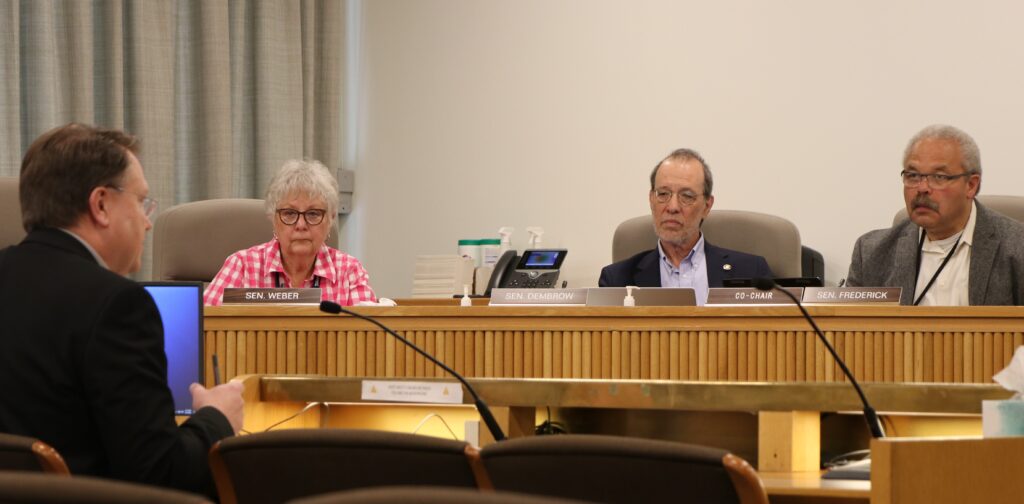
Oregon Department of Education Director Colt Gill testifies Wednesday against a bill amendment that would tap the Student Success Act to pay for early literacy initiatives. Sens. Suzanne Weber, Michael Dembrow (center) and Lew Frederick of the Joint Ways and Means Education Subcommittee listen. (Photo by Jake Arnold, OSBA)
Gov. Tina Kotek’s priority early learning bill cleared a committee Wednesday. Education advocates are fuming about its funding source, and even Kotek’s representatives have opposed the bill as written.
A late-emerging amendment would take money away from the Student Success Act’s Student Investment Account and put it toward early literacy efforts. Education advocates praised the bill’s policies while calling it twisted logic to shift funding and name it an “investment.”
Oregon Department of Education Director Colt Gill said the governor has been clear her early learning can be paid for through the general fund, with the recent positive economic forecast making that even easier.
“Our hope is to see the literacy initiative get off to a good start and that we can preserve the integrity of the Student Investment Account,” he said.
Gill testified Wednesday against the amendment. He said Oregon needs a systematic approach to address its early literacy challenges, while redirecting SIA money could increase academic disparities in some districts.
House Bill 3198 would create three grant programs to reduce early learning educational inequities and improve statewide literacy from infants to grade three. Legislative leaders have promised $140 million to pay for teacher training, summer programs, tutoring, research-based curricula, literacy specialists and parent and community engagement.
Education advocates roundly supported the initiative but have been wary of where the money will come from, worried it might take away from other education funding. Their fears appear justified.
On Sunday, legislative leaders unveiled an amendment to HB 3198 that would fund it from the Student Success Act money. The 2019 act created a new tax explicitly to generate additional funding for Oregon’s education system through three accounts: The Student Investment Account, the Statewide Education Initiatives Account and the Early Learning Account.
According to statute, the SIA gets at least 50%, education initiatives receive up to 30% and early learning is allotted at least 20%. The SIA goes directly to K-12 school districts based on enrollment and with broad discretion for how they can use it. This biennium schools received $892 million, which they spent on things such as smaller learning groups, enhanced education programs, and increasing student and teacher supports.
School leaders and legislators have praised the Student Success Act as a generational investment in education that is making a real difference for students. The big fear at the time it passed, though, was that future Legislatures might chip away at it, as had happened with three previous major education initiatives.
HB 3198 knocks a big chunk out of the act.
The amended HB 3198, which passed the Joint Ways and Means Education Subcommittee on Wednesday, takes money from all three act accounts, with $116 million from the SIA. In a subcommittee hearing Monday morning, education representatives lined up to say they enthusiastically support HB 3198’s policy goals but adamantly oppose its funding mechanism.
Pooja Bhatt, Kotek’s education initiative director, told the subcommittee that the governor’s office has concerns about a funding mechanism that appears to be a carve-out.
Susan Allen, Oregon School Employees Association government relations specialist, said the OSEA was strongly in favor of creating a new mechanism to support early childhood education but opposed the bill based on the funding method. She pointed out the SIA is meant for school districts serving K-12.
Louis De Sitter, Oregon Education Association public affairs consultant, said the SIA was intended for targeted local needs, not statewide initiatives.
“This would effectively be a cut,” he said. “This would be a cut to class sizes and a cut to mental health supports.”
Districts have used extensive community engagement to create detailed local plans for their SIA grants, predicated on stable funding.
Parasa Chanramy, Coalition of Oregon School Administrators legislative director, said it was forcing “massive changes” to the Student Success Act that could take away from its intended mission.
Julie Neburka, a Legislative Fiscal Office analyst, said legislative leaders tapped the Student Success Act because they wanted a reliable and secure source of ongoing funding. HB 3198 would permanently change the allowable SIA uses to include early learning funding.
The bill’s supporters characterized the early learning money as drawing off money in excess of the SIA “current service level.”
Lori Sattenspiel, OSBA Legislative Services director, was among those who disputed that characterization. Sattenspiel, who worked closely with legislators during the act’s creation, said the act’s calculation never included the idea of maintaining current services and programs. The corporate activity tax generates money, and however much money comes in is supposed to go to education as additional funding.
Sattenspiel told legislators that dipping into the SIA “feels like a little raid.”
The discussion Monday carried over to Wednesday as legislators sought more information. The amended bill was sent Wednesday to the full committee on a party-line vote, although without much enthusiasm from some legislators. The full Joint Ways and Means Committee is expected to hear it soon.
Sen. Lew Frederick, D-Portland and co-chair of the subcommittee, was on the committee that launched the Student Success Act. Speaking Wednesday after the vote, he said it was important to do something for early literacy but he didn’t want to see the act used that way again.
– Jake Arnold, OSBA
[email protected]